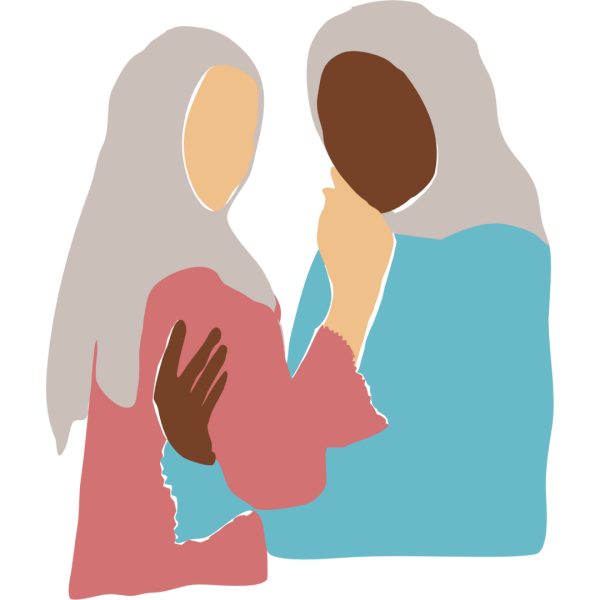
Sahara Scotland
سحارة – Arabic सहरा – Hindi صحرا - Urdu
Specialist casework service for Muslim & BME women in Scotland
Sahara Scotland is Amina MWRC's Independent Domestic Abuse Advocacy (IDAA) service.
We provide specialist domestic abuse case work with culturally sensitive support for Muslim & BME women in Scotland who meet the following criteria:
- Are at risk of or currently experiencing domestic abuse
- Hold insecure immigration status
- Require dedicated 1:1 support
Sahara Scotland caseworkers can provide support to women. This service includes:

Advocacy

Risk assessment & safety planning

Emotional support and a listening ear

Immediate to high-risk support

Crisis intervention

Support in community languages
What is Domestic Abuse?
The Scottish Government’s definition of domestic abuse in Scotland is:
"Any form of physical, verbal, sexual, psychological or financial abuse which might amount to criminal conduct, and which takes place within the context of a relationship. The relationship will be between partners (married, cohabiting, civil partnership or otherwise) or ex-partners."
What is Coercive Control, and how do I recognise it?
The definition of coercive control under Scottish legislation describes a range or pattern of behaviours that enable a perpetrator to maintain or regain control of a partner, ex-partner or family member.
This may include but is not limited to
- Isolating a woman
- cutting or limiting contact with family/friends
- playing mind games
- monitoring your phone calls
- controlling what you eat
- controlling how you dress
- limiting where you can go
- controlling how and what you cook
What is the Sahara Scotland service and how does it work?
- Once a referral has been received- an intake form will be filled in.
- The client will be contacted by our caseworkers to address any immediate safety issues.
- The caseworker will complete a DASH RIC and work with the client to create an individualised safety and support plan.
- The caseworker will hold regular risk and case reviews until the client is safe, either in refuge accommodation or within their own accommodation.

Psychological & Emotional Abuse
Psychological or emotional abuse could involve name calling, constant criticism, threats to them, their family or pets and being put down in front of others.
Using emotional blackmail, threats of suicide or using guilt-trip tactics. Similar to coercive control it can also include being isolated from friends and family.
They may also closely monitor your social media activity- controlling who you can communicate with or Constantly texting you and making you feel you can’t be separated from your phone.
Insisting that you give them your passwords to your email or your social media accounts.
Another common sign of abuse is limiting your movements, by stopping you from going to work, college or seeing your friends or family. They may also make unreasonable demands of your time by expecting you to provide a large amount of domestic labour (cooking multiple meals per day, cleaning, laundry, caring for children other than your own, household shopping). This can also lead to exhaustion which is a key element of abusive behaviour.
Emotional abuse can also include making accusations of having affairs, flirting, controlling what you wear and tracking your movements without your consent.

Financial or Economic Abuse
Financial or economic abuse can take many forms.
It may include money being withheld or being forced to borrow money.
In some cases it may involve being forced to make benefit claims, having to account for money spent, not being allowed to control own finances or not having access to your own bank account.
If your partner tries to control where you spend your money or does not give you enough money to buy food or essential items, this is also financial / economic abuse.

Physical & Sexual Abuse
Physical and sexual abuse may include but is not limited to hitting, slapping, choking, punching, threats with weapons and or death. It can also include rape, sexual assault, forced to imitate pornography, forced to have unprotected sex, penetration with objects, forced to have sex with others.
Your partner may have taken intimate images/videos with or without your consent, if they are threatening to share these images with others this is known as non-consensual dissemination of intimate images or revenge porn.
Why Sahara?
Addressing the intersectional needs of Muslim & BME women requires understanding cultural and religious values of the women, adopting an empathetic response to cultural and religious nuances that can impact how a woman accesses support and what measures should be put in place to ensure BME & Muslim women feel heard, understood and validated.
Amina MWRC is a by women / for women organisation, with a staff largely comprised of women from the BME & Muslim community who can clearly identify with the needs of our clients.
In 2021, the first year of our funding from the EQHR stream of the Scottish Government, the casework service supported over 80 women. In the last year we have seen a staggering increase of over 100%, with 388 women supported in 2023.
We have supported 1074 women experiencing domestic abuse.
Since 2021 we have seen an increase of over 100% in the number of women supported with NRPF (No Recourse to Public Funds) - with 388 supported in the last year.
Client Case Study

Amina’s Casework service supported Leena (not a real name) fleeing a domestic, financially abusive and controlling relationship by the in-laws.
Leena arrived in Scotland on a spousal visa. Just over a year later she discovered her husband’s intention to isolate her by sending her back to Pakistan and keep her daughter in Scotland. Leena felt helpless and financially restricted and the spousal visa she was on meant she had no recourse to public funds (NRPF). She could not even buy nappies for their daughter without asking her husband.
When the husband found out Leena was seeking advice, he took away any connection she had with the outside world. Her phone contract was terminated and access to the internet was removed. She was given meals and not allowed to leave her room. English was not Leena’s first language and she believed everything she was told. She did not know her rights and thought the same laws that governed Pakistan applied in Scotland. Leena was told if she did not “obey” her husband and his family she would be thrown out onto the streets and no one would help.
Leena managed to reach out to a local shop assistant, Bilal, who generously gave her a new sim card topped up with credit. Bilal contacted Amina MWRC on behalf of Leena and reported his concerns.
A taxi picked up Leena and her daughter and went to a refuge. Amina put in place a safety plan, working with an immigration solicitor to apply for a DDV (Destitute Domestic Violence) concession visa, supporting Leena with reporting the abuse to the Police and attending appointments with a family solicitor to apply for divorce, and seek advice about child custody.
Amina made a referral to MARAC (Multi-Agency Risk Assessment Conference) because Leena was at high risk of honour-based abuse and worked closely with multi organisations to support Leena.
Longer term, Leena was successful in obtaining sole custody of their daughter because of the amount of evidence showing abuse and threat to life presented. Leena was supported by Amina in her DDV application and has since received ILR (Indefinite Leave to Remain). Language was a barrier to Leena seeking help and advice, but, by contacting Amina, Leena states she was pleased to have found someone who spoke her language and understood the cultural barriers in place.
Leena has now successfully completed her English course, is able to advocate for herself, and attends classes to advance her qualifications. Leena continues to receive ongoing support from Amina, focusing on rebuilding her life. Leena is hoping to go into employment for the first since being in the UK and appreciates the support she received from the system in place at Amina.

